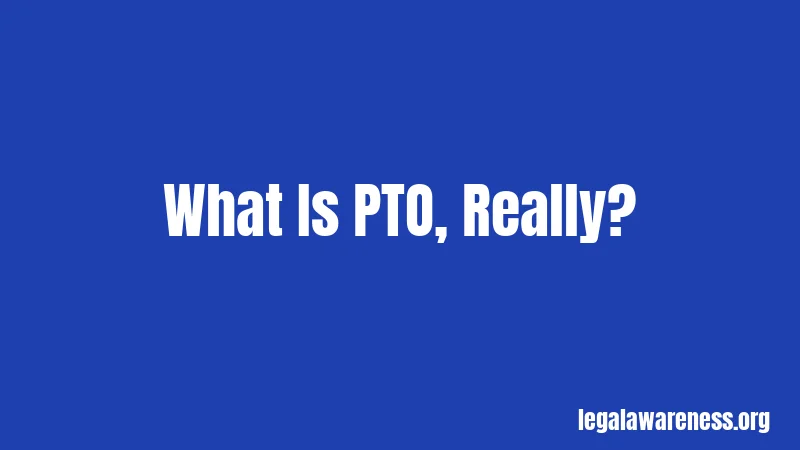PTO Laws in Texas (2026): Your Complete Rights Guide
Most people think paid time off is guaranteed by law. Here’s the surprise: it’s not, at least not in Texas. Seriously. The Lone Star State has basically zero requirements saying employers have to give you vacation days or sick leave. But before you panic, here’s the good news. Most Texas businesses do offer PTO anyway. They do this to attract and keep good employees. Plus, there are still rules you need to know about. Let me break down exactly what your rights are.
If you work in Texas, you probably want to understand what time off you’re actually entitled to. The laws around this stuff can be confusing. You might think everything is required, or you might think nothing is. The reality? It’s somewhere in the middle. Let’s untangle this together.
What Is PTO, Really?

PTO stands for Paid Time Off. Think of it as money your company pays you even though you’re not working. It typically includes vacation days, sick days, personal days, and sometimes other types of leave. So simple!
When your company gives you PTO, they’re saying, “Take this day off, and we’ll still pay you.” The key word here is paid. If you take unpaid time off, that’s different. You don’t get paid for those days.
Here’s the thing: Texas doesn’t require companies to offer PTO at all. Your employer could legally offer zero vacation days and zero sick days. That’s actually legal. Right? But that’s not what most businesses do. Around 87 percent of Texas companies offer some kind of PTO to their employees.
Texas Vacation Laws: The Big Picture
Let’s start with the most important part. Texas has no state law requiring vacation days. Zero. Your employer doesn’t have to give you a single vacation day if they don’t want to. That’s completely legal under Texas law.
But here’s where it gets interesting. If your employer does offer vacation time, they have to follow their own written policy. That’s the key. Once they put a policy in place, they have to stick to it. They can’t just change the rules whenever they feel like it.
This means you should always read your company’s vacation policy carefully. That document matters more than you might think. It’s basically your contract for how much time off you get and what happens to unused days.
Wondering what counts as vacation? Generally, it’s days you take for relaxation, travel, or personal reasons. It’s different from sick days, which are specifically for when you’re ill.
How Does PTO Accrue in Texas?

Since Texas employers have total control over vacation policies, they can decide how PTO gets built up. This is where it gets important to understand your specific situation. The most common way is called accrual.
Hourly accrual is popular. You might earn 1 hour of PTO for every 40 hours you work. So if you work full-time, you’d earn roughly 2 days per year. Monthly accrual works differently. You get 1 full day of PTO for every month you work. That adds up to 12 days per year.
Some companies do lump sum allocation instead. They give you 10 to 30 days all at once, right at the start of the year. You use those days throughout the year. No accrual needed.
Stay with me here. Tiered leave is another option. You might get 10 days in your first year. Jump to 15 days after 5 years. Then 20 days after 10 years. This rewards loyalty.
Your company decides which system works best for them. There’s no “right” way in Texas. The important thing is that they tell you exactly how it works. No surprises allowed.
What About Carrying Over Unused Days?
Here’s where Texas employers get some power. Use-it-or-lose-it policies are completely legal in Texas. That means your company can say, “If you don’t use your vacation days by December 31st, you lose them.”
That actually happens. Pretty straightforward. Some employees worry about this. If you have 10 days left over at the end of the year, and your company has a use-it-or-lose-it policy, those 10 days disappear. You don’t get paid for them. You just lose them.
But here’s what most companies actually do. Around 80 percent of Texas businesses allow you to carry over unused vacation days into the next year. They might cap it though. Your employer could say, “You can roll over unused days, but only up to 5 days maximum.” That way, companies keep some control.
The bottom line? Check your company handbook. It will tell you exactly what happens to unused days. If you’re not sure, ask HR. This is too important to guess about.
What Happens When You Leave a Job?

Okay, pause. Read this carefully. This is where a lot of people get confused. When you quit or get fired, do you get paid for leftover vacation days?
In Texas, the answer depends on two things: your company’s policy and whether you have a contract. If your company policy says you get paid out for unused vacation when you leave, then you get paid. That’s binding.
If your company policy is silent on this (meaning it doesn’t say either way), Texas law says the company doesn’t have to pay you. Honestly, this surprises a lot of people. But that’s how it works here.
This is why reading your employment contract and handbook matters so much. Look for language about “payout upon termination” or “final paycheck.” If it mentions unused vacation, you’re protected.
Some companies actually go further than the law requires. They choose to pay out unused vacation to make employees happy. That’s their decision. But Texas doesn’t force them to do it.
Texas Sick Leave Laws
Now let’s talk about sick days. This is where federal law matters more than Texas law. Texas doesn’t require paid sick leave. But federal law does require some paid leave in certain situations.
The big one is the Family and Medical Leave Act, or FMLA. This federal law applies in Texas just like everywhere else. If your company has 50 or more employees, and you’ve worked there for at least 12 months, you can take up to 12 weeks of unpaid leave for medical reasons or family emergencies.
Here’s what’s important: that leave is unpaid. Your company doesn’t have to pay you while you’re out on FMLA leave. But the law protects your job. You have to get it back when you return.
Many Texas companies voluntarily offer paid sick leave anyway. This isn’t required, but employers do it to stay competitive. Around 87 percent of Texas companies offer some type of paid sick leave to attract talent.
If your employer offers paid sick days, they must follow their written policy. Just like with vacation days, their own rules become binding once they’re in writing.
Combining Vacation and Sick Leave Into One PTO Bank
This is becoming super popular in Texas. Companies create what’s called a “consolidated leave package.” Basically, vacation and sick leave get mixed together into one bucket called PTO.
So instead of “You get 10 vacation days and 5 sick days,” it becomes “You get 15 PTO days, use them however you need.” Employees can use those 15 days for vacation, sickness, or personal time. You decide.
Around 48 percent of Texas employers now use this approach. It’s easier to track. It’s simpler for employees to understand. It makes sense, right? Why shouldn’t you use a sick day for vacation if you want to?
When companies consolidate leave like this, they still have to follow all the rules about accrual, carryover, and payout. The type of leave doesn’t change the requirements, just how it’s labeled.
Federal Leave Laws That Apply in Texas
Texas employers can’t ignore federal law just because state law is relaxed. Federal leave laws absolutely apply here. Let me walk you through the big ones.
Family and Medical Leave Act (FMLA) gives you up to 12 weeks of unpaid, job-protected leave for qualifying reasons. These include your own serious health condition, caring for a family member, birth or adoption, or military caregiver leave. But you only qualify if your employer has 50+ employees and you’ve worked there for at least 12 months.
Jury duty is another one. If you’re called to serve on a jury, Texas law protects your job. Your employer can’t fire you for going to jury duty. Many employers pay you for jury duty time, but they’re not required to under state law. That depends on company policy.
Voting leave also applies. You have the right to take time off to vote. Your employer can’t retaliate against you for voting. Again, most companies pay for this, but they’re not required to.
Military leave is protected too. If you’re in the military reserves or National Guard, you have rights under federal law. Your employer must give you time off for military duties.
Recent Changes to Texas PTO Laws in 2025-2026
Here’s where it gets interesting. Texas itself hasn’t changed its state-level PTO laws recently. But there are things happening that matter to you. Hold on, this part is important.
Some Texas cities are pushing for local paid leave ordinances. Austin and Dallas have been discussing mandatory paid sick leave. These efforts sometimes get blocked by courts, but they keep coming up. Even if they don’t pass, companies in these cities might go ahead and offer paid sick leave anyway to stay competitive.
The Texas Workforce Commission is also putting more emphasis on compliance. They’re auditing businesses to make sure leave policies are clearly written and correctly communicated to employees. This actually helps you. Clearer policies mean fewer disputes.
There’s also increased attention on making sure FMLA is handled correctly. If your company qualifies for FMLA, they need to notify you properly. You have rights, and your company has to make sure you know what they are.
Personally, I think this push toward clearer policies is good news for workers. It means companies have to be transparent about what they’re offering.
What Your Employer Must Tell You
Here’s what matters: your employer must give you written notice about your PTO rights. This usually comes in a handbook or policy document. By law, they can’t just tell you verbally and call it good.
That written policy needs to cover several things. First, how much PTO you earn and how it accrues. Second, when you can start using it. Third, what happens to unused time. Fourth, how you request time off.
Your employer also needs to explain how their policy works with federal laws like FMLA. If you’re eligible for FMLA protection, they have to tell you. Many people don’t even know they’re protected, and that’s partly because companies haven’t communicated clearly enough.
If your company offers other types of leave, they need to explain those too. Bereavement leave, parental leave, military leave, voting leave. All of it should be documented.
The reason for all this? Simple. It prevents disputes later. If everything is in writing, you both know what to expect. No confusion. No arguments about whether you were entitled to something.
What If Your Company Doesn’t Follow Its Own Policy?
Not sure what counts as a violation? Let me break it down. If your company has a written policy and then doesn’t follow it, that’s a problem. For them, not necessarily for you legally, but practically it affects your paycheck.
Let’s say your handbook says “employees get paid for unused vacation time at termination.” You leave your job with 10 days unused. Your company should pay you for those 10 days. If they don’t, that’s a breach of their own policy.
Here’s the tricky part though. Texas law doesn’t automatically give you a lawsuit right if your company breaks their own rule. That’s actually different from some states. But if there’s a contract involved or if a court interprets the policy as a contract, you might have legal standing.
The practical answer? Talk to your company first. Document everything. Talk to HR. If they still won’t pay, then consider talking to an employment lawyer. You might have a case, but it’s not automatic.
When You’re Part of a Collective Bargaining Agreement
Some Texas employees are part of unions with collective bargaining agreements. If that’s you, congratulations. You probably have better leave protections than what we’ve been discussing.
Union contracts often override state and federal minimums. They require more PTO, more paid sick leave, better payout terms. That’s literally the point of union negotiation.
If you’re union, check your contract. It probably contains your actual PTO rights, and those rights are legally binding. Your company can’t just ignore what’s in your union agreement.
Special Cases and Exceptions
There are some special situations worth knowing about. If you work for a government agency in Texas, different rules might apply. State employees and local government employees often have better leave benefits than private employees.
If you work for a very small company with just a few employees, they’re still not required to offer PTO under Texas law. But if they do offer it, they still have to follow their own policy.
Independent contractors and gig workers don’t get PTO at all under Texas law. If you’re 1099, you don’t get paid time off. You only get paid when you work. That’s something to consider when deciding between contract work and employment.
If you’re a temporary or seasonal worker, your employer might offer different PTO terms. This is legal. The rules say employers can have different policies for different categories of employees.
How to Request PTO in Texas
Okay, so you know your rights. Now what? How do you actually request time off? Most companies have a process. Usually it’s pretty straightforward.
Most Texas employers require you to ask your supervisor or submit a request through a system. Give as much notice as possible. Some companies require 2 weeks notice for vacation. Others want 30 days.
For sick leave, obviously you can’t always plan ahead. Call or notify your supervisor as soon as possible when you’re sick. Most companies accept same-day notice for sick time.
Your employer can require documentation for extended absences. If you’re out for more than 3 days, they might ask for a doctor’s note. That’s legal and reasonable.
During your request, be respectful of your company’s needs. The fact that you have PTO doesn’t mean you can take it whenever you want without considering work. Employers can deny requests if they create serious problems, though this varies by policy and situation.
What to Do If You’re Denied PTO You’re Entitled To
Sound complicated? It can be. If your company refuses to let you take PTO that you’ve earned and that your policy says you can use, you have options.
First, go to HR. Explain the situation. Get the denial in writing if possible. Sometimes this is just a miscommunication that HR can fix immediately.
Second, know the relevant rules. Is your company violating their own written policy? If yes, that strengthens your position. Get copies of the policy and document everything.
Third, if it involves FMLA, the situation is different. Under FMLA, your employer can’t deny protected leave. If you’re entitled to FMLA protection and your employer denies it, that’s illegal.
If HR won’t help, you might need an employment lawyer. Seriously. An attorney can review your situation and tell you if you have a case. Many offer free consultations.
Frequently Asked Questions
Does Texas require paid vacation? No. Texas has no law requiring employers to offer paid vacation. However, most Texas employers do offer PTO voluntarily.
What’s the difference between using PTO and being fired? If you have PTO and take time off, you’re still employed and getting paid. If you’re fired, your employment ends and you get a final paycheck. Totally different situations.
Can my boss deny my PTO request because we’re busy? It depends on your company policy. Some policies give employers flexibility to manage timing. Others protect your right to use earned time. Check your handbook.
Do I get paid for leftover vacation when I quit? Only if your company policy says so. Texas doesn’t require payment. The policy matters most. Read your handbook or ask HR before you quit.
What happens to my PTO if I’m laid off? Same answer. Only pay if the policy requires it. Though note that some courts look at industry practices when interpreting ambiguous policies.
Is military leave paid in Texas? Federal law protects your job for military service, but payment depends on your company policy. Many companies pay, but they’re not required to.
Can I carry over vacation days to next year? Depends on your company. They can have a use-it-or-lose-it policy, or they can allow carryover. Check your handbook for your company’s specific rule.
What if my company keeps changing the PTO policy? Your company can change policies going forward, but they usually have to honor existing accrued time. If you have 10 days earned, they typically can’t just take those away.
Final Thoughts
Here’s the bottom line: Texas gives employers tons of freedom when it comes to PTO. But that freedom comes with one requirement. Whatever your company puts in writing, they have to follow. Your handbook is your guide.
You have more protection than you might think if your company has documented policies. Federal law also steps in for FMLA situations. Know your rights. Read your handbook. Ask HR when you’re confused.
The best approach? Talk to your employer about PTO expectations early. Ask for clarity on how it works, when you can use it, and what happens at the end of the year. Document important conversations.
Now you know the basics. Stay informed, stay safe, and when in doubt, look it up or ask a lawyer.
